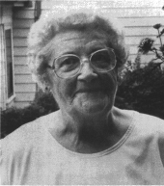


Outside riding herd on six children, believe me, that was my job.
Mary Gardner is a woman in her mid 70's. She has eight grown children, she resides with her husband in Wakefield on a nice suburban street. She has a cheery disposition, highlighted by crystal blue eyes. She is very close to her husband and children. This story is about Mary, who raised her children during World War II all by herself, while her husband was in the Pacific serving his country. She said there were things which the children did that would have been better taken care of by a man, but she took all the responsibility into her own hands -- discipline, clothing, schooling, and caring for them.
We had two girls and four boys. Cliff was 11. Marilyn was 10. Bill was 8, Norman was 6 and Betty Jane was 4.
She had another child Frank in 1941.
We knew about the war, what was going on and everything, but it was in Europe. You know how far you're removed from that. You read about it, but it doesn't really hit home until all of a sudden it's on your own doorstep.
Since Mary had six children, rationing was a very big part of their lives. There were tricks that were used to stretch food and the rationing itself affected what the children liked or didn't like.
They had margarine with like a small egg in it with color in that. You'd have to squeeze that and work it in until such a time it was the color that you wanted. The kids hated that. They used to do that.
My father was an avid fisherman and we ate a lot of fish because the meat was rationed. To this day, some of them like fish and some of them don't, because they had lots of fish.
It was tight at times. You had to stop and think of what you were going to buy, and buy things that were going to stretch, maybe spaghetti, macaroni and mix it up with something else. I'd say in the summer months we were fortunate that we had fresh produce. I never did much canning because that was a concentrating job, and you were trying to watch kids and not mess up what you were doing.
How did you spend your leisure time?
Well, we used to go out for a ride because when you have six kids you don't do too dog gone much, believe me. We used to go visiting and whatever, but we didn't socialize too much. The two boys, they used to set up pins at the bowling alley. Not the oldest one, but the two younger ones.
Imagine trying to keep six growing children in nice school clothes when fabric was needed for the war effort.
Well, we had a little difficulty keeping children in clothes. For myself, I didn't desire too much, but to keep them clothed to go to school and whatever. There was no hand-me-downs. They just wore them out. As I say about the shoes, it was rough keeping them in shoes.
Discipline was one of the major problems Mary was faced with.
Well, it was just some fun keeping track of these youngsters, making sure where they were and such things. That meant that I couldn't say to my husband, "Well, so and so did such and such a thing." I took care of that pretty well, but there were times when it should have been a man's job to do these things. I had to do it. I can't even begin to tell because these boys were something else. But it was just that they needed a firm hand to bring them back into line. But I never wrote to him and told him all of the things that went on. I figured he had job enough. It was just the every day routine, cooking and washing, which were endless jobs. I didn't have a washing machine then. No dryer. Outside was the dryer. So it kept me busy.
What was your reaction when the war ended?
Relieved, really. Very happy that that was it because it changed a lot of people's lives, particularly if they lost somebody in the war. Well, you know, it was a little difficult getting back into the stream again when you have been away like that. Some people handle it and some people don't.
How did the war change your life?
Well, it made for better living, I guess. That's about what I would tell you. We had more after the war because the pay was better. You could do things that you couldn't do before
She has weathered the years and so have her memories.
Copyright 1995